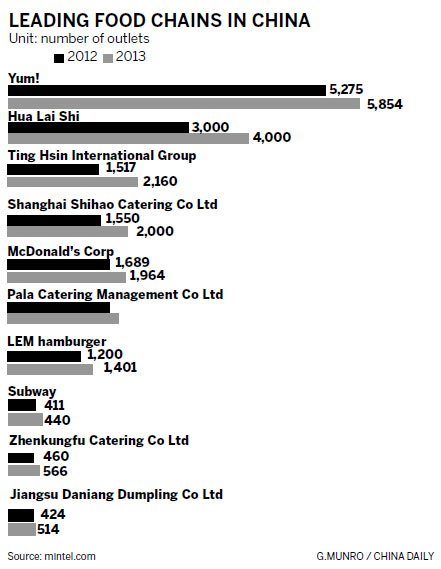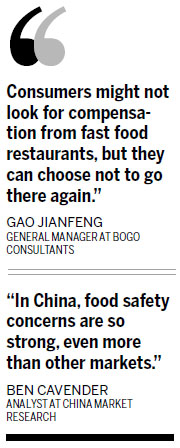Top chains may suffer a backlash that lingers
Updated: 2014-07-22 07:40
By Wang Zhuoqiong (China Daily)
|
||||||||

Concerns about restaurant safety expected to affect supply system
Leading fast food chains in China - McDonald's, KFC and Pizza Hut - are expected to suffer a lingering impact from recent media reports involving a food supplier allegedly using meat products past their expiration dates.
Shanghai's Food and Drug Administration said it was investigating the claims that Shanghai Husi Food Co, which is solely owned by Chicago-based food company OSI Group and has 10 factories in the country, was selling chicken and beef that had exceeded its sell-by date.
McDonald's and Yum! Brands, which owns KFC and Pizza Hut, quickly issued statements apologizing to consumers and halting the use of products from the supplier.
The fast food chains only recently recovered from a food safety issue involving suppliers less than two years ago.
In December 2012, Shanghai authorities said that tests conducted from 2010 to 2011 by a third-party agency found high antibiotic levels in eight batches of chicken supplied to Yum by Liuhe Group Co. The company also supplied McDonald's in China at the time.
Yum, which gets about half of its revenue from the Chinese market, has lost its market share from its peak days, but in the first two quarters of this year its revamped menu and newly designed store layouts have attracted consumers back and boosted sales and profits.
 Ben Cavender, an analyst at Shanghai-based China Market Research, said the new allegation is going to have a lasting impact on both brands despite their responses to make consumers feel better.
Ben Cavender, an analyst at Shanghai-based China Market Research, said the new allegation is going to have a lasting impact on both brands despite their responses to make consumers feel better.
But Yum will take more of a hit due to food safety problems in the past, which indicates the company is less likely to control its suppliers well, he said.
Even if they were only indirectly responsible, in the eyes of consumers their brands are going to be hurt, said Cavender.
The allegations have once again reminded consumers of recent food scandals including baby formula laced with melamine and fox DNA found in donkey meat.
"In China, food safety concerns are so strong, even more than other markets," he said.
Bian Jiang, deputy director of the China Cuisine Association, said it is challenging for restaurants to test the quality of products from suppliers that have proper tags, tracking codes and qualifications. But leading chain restaurants should improve their methods in monitoring and testing to avoid the negative impact from food safety issues.
Gao Jianfeng, general manager at Shanghai-based Bogo Consultants, said the incident, if true, will affect the supply system of these major fast food chains in the country due to the large quantity of their demands for quality meat.
Neither company responded to China Daily's questions.
Gao said that no matter who is responsible, most of the damage will be cast on the market leaders.
"Consumers might not look for compensation from fast food restaurants, but they can choose not to go there again," he said.
Contact the writer at wangzhuoqiong@chinadaily.com.cn

 A bike ride helps Cuban editor fit into Chinese society
A bike ride helps Cuban editor fit into Chinese society
 Chinese students fall for Cuba
Chinese students fall for Cuba
 Osmani Castillo — Cuban chef in China
Osmani Castillo — Cuban chef in China
 Xi's visit takes China-Venezuela ties to a 'strategic' level
Xi's visit takes China-Venezuela ties to a 'strategic' level
 Separatists take black boxes, bodies
Separatists take black boxes, bodies
 Former president Carter lauds US-China relations
Former president Carter lauds US-China relations
 UN energy program to lift China fund
UN energy program to lift China fund
 Women trade empower ideas
Women trade empower ideas
Most Viewed
Editor's Picks

|

|

|

|

|

|
Today's Top News
RMB developing quickly as major world currency
China, Cuba to further advance ties
Chinese get to know Cuba through salsa
Caracas seeks to lure more Chinese tourists
Xi arrives in Venezuela for state visit
Chinese students rank highest in financial literacy test
Chinese President Xi leaves for Venezuela
Black boxes of MH17 under 'control': rebels
US Weekly

|

|





